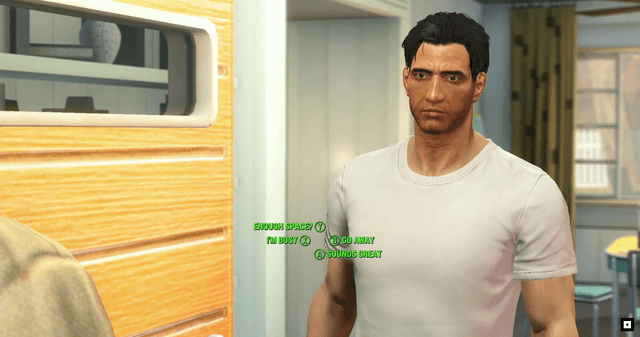With Fallout 4 releasing all over the place, it’s hard not to see bits and pieces over the net, and some of us, myself included, just didn’t have the time or cash for the real deal, and now that it’s here, I’m glad I didn’t.
I’m sure I’ll eventually jump onto the Fallout 4 bandwagon, having played through every title, even the less-than-stellar Brotherhood of Steel, but one mechanic makes me want to wait for a sale: the dialogue wheel.
Some story-driven games have taken advantage of this concept in the past. Of note, the Mass Effect series, and, to provide a more recent comparison, The Witcher 3: Wild Hunt, have both used the dialogue wheel to great effect.
However, this isn’t a mechanic that belongs in the Fallout franchise, and here’s why.
Let’s use The Witcher 3 as an example. In the Witcher series, you’re playing as Geralt. No matter who you, the player outside the game are, you are taking on the role of a character with a very specific backstory and complex personality. While the choices you make for Geralt will influence the way the story plays out, his personality is still distinctly Geralt, no matter how you play the game. It is a series that has been building an established character, so giving him voice-acted lines and a dialogue wheel makes perfect sense.
Now, let’s compare that to the Fallout series. These are games with a distinct character creation system. You determine your character’s race, gender, capabilities, and name. Then, when you begin encountering other characters in the world, the dialogue options you’re prompted with are a tool through which you shape your character’s personality.
Note the scroll wheel and the extensive options being presented, each of which is provided to you, the player, word-for-word before delivering it to the NPC.
Now, however, the options in dialogue are severely limited.
With your character being fully voiced, Bethesda is trading in a player-perceived ‘voice’ and personality for the protagonist, and replacing them with a voice and personality intended for the character. This might be passable in a game like The Witcher because it is Geralt’s story, but in the Fallout series, it’s supposed to be your story.
Now, with Fallout 4, you are, essentially, making choices for a character who will then play out those choices as he or she sees fit. You are given no insight into the character’s exact delivery of your decision until your choice is made.
What do I mean by this?
Let’s take a look at one of the earliest dialogue wheel options we’ve been presented by Bethesda.
Obviously, each choice on this wheel presents the gist of what your character is going to say, but you have no idea how the character is going to deliver it. He isn’t going to just say “I’M BUSY,” or “GO AWAY” in the scene above. You aren’t absolutely aware of what your character is about to say or do, even if you get to nudge the character toward that specific action.
This creates a dramatic disconnect between the character and the player, and leads to you and your character being portrayed separate entities.
To provide an example of why not being entirely in the “head” of your character in this sort of game can be a problem, look no further than The Witcher 3, where one option is to “shove” a character aside. What Geralt ends up doing is pushing the character down, breaking his leg, and, consequently, breaking off all ties with him.
That’s not to say this is a crucial flaw of the dialogue wheel in The Witcher 3. In fact, it’s somewhat amusing that the game gives the nonchalant option of “shove” for what Geralt does to Djikstra, as it shows how brutal of a character he is. However, not communicating the exact details of what your character is going to say, combined with the fact that the protagonist has a canonical voice in all dialogue, creates a very clear disconnect between player and protagonist.
If this is the direction Bethesda wishes to take the series, more power to them, however, it is a drastic change in how Fallout will immerse the player and tell its story.
What are your thoughts? Is the dialogue wheel a welcome change for convenience? Do voice-overs add more to the game? Or are these features that will ultimately detract from the immersive, player-driven experience that the Fallout series has traditionally offered?










Published: Nov 9, 2015 07:44 pm